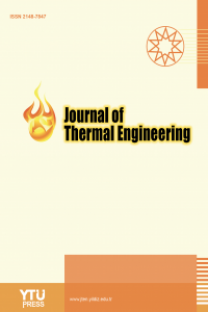ADVANCED EXERGY ANALYSIS OF AN ORGANIC RANKINE CYCLE WASTE HEAT RECOVERY SYSTEM OF A MARINE POWER PLANT
___
- [1] Pachauri, R.K., et al., Climate Change 2014: Synthesis Report. Contribution of Working Groups I, II and III to the Fifth Assessment Report of the Intergovernmental Panel on Climate Change. 2014.
- [2] Smith, T., et al., Third IMO GHG Study 2014. International Maritime Organization (IMO), London, 2014.
- [3] Baldi, F. and C. Gabrielii, A feasibility analysis of waste heat recovery systems for marine applications. Energy, 2015. 80: p. 654-665.
- [4] MAN Diesel&Turbo, Waste heat recovery system (WHRS) for reduction of fuel consumption, emissions and EEDI, in Copenhagen, Denmark. 2014b, MAN Diesel, Augsburg, Germany.
- [5] Alvik, S., et al., Pathways to low carbon shipping-abatement potential towards 2030. 2009.
- [6] Shu, G., et al., A review of waste heat recovery on two-stroke IC engine aboard ships. Renewable and Sustainable Energy Reviews, 2013. 19: p. 385-401.
- [7] Wärtsilä, Solution for merchant vessels, W.r. Corporation, Editor. 2010.
- [8] MAN Diesel&Turbo, Thermo efficiency system for reduction of fuel consumption and CO2 emission. 2014a, MAN Diesel, Augsburg, Germany: Kopenhagen, Denmark.
- [9] Sprouse III, C. and C. Depcik, Review of organic Rankine cycles for internal combustion engine exhaust waste heat recovery. Applied Thermal Engineering, 2013. 51(1–2): p. 711-722.
- [10] Chen, H., D.Y. Goswami, and E.K. Stefanakos, A review of thermodynamic cycles and working fluids for the conversion of low-grade heat. Renewable and Sustainable Energy Reviews, 2010. 14(9): p. 3059-3067.
- Yayın Aralığı: 6
- Başlangıç: 2015
- Yayıncı: YILDIZ TEKNİK ÜNİVERSİTESİ
Bhupender SHARMA, Gulshan SACHDEVA, Gian BHUSHAN
Cihan KABOGLU, Soraia PIMENTA, Andy MORRIS, John P DEAR
Mesut GÜR, Nezaket PARLAK, Tahsin ENGİN, Hasan KĞÇÜK
